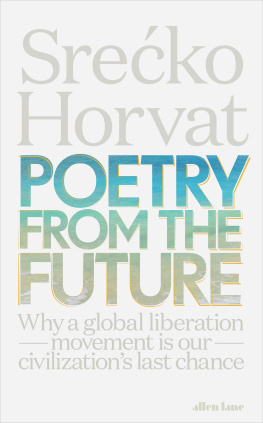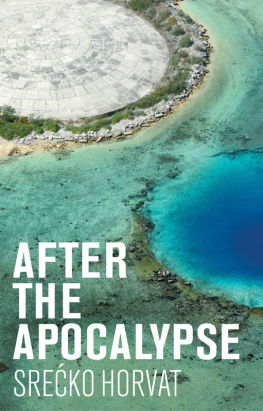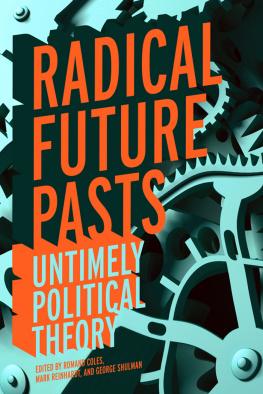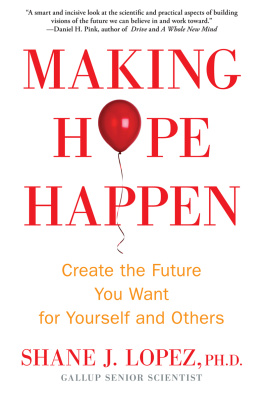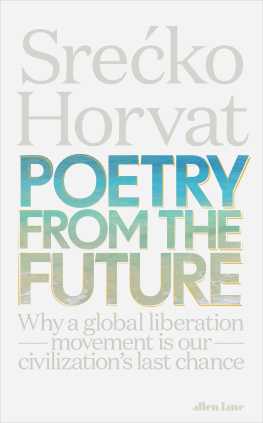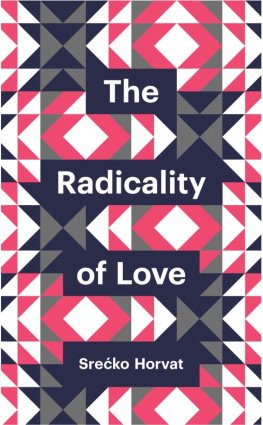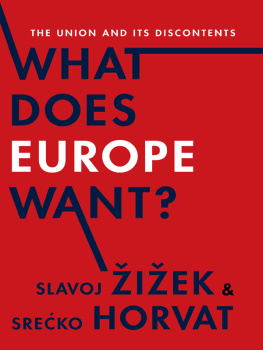Sreko Horvat
Poetry from the Future

ALLEN LANE
UK | USA | Canada | Ireland | Australia
India | New Zealand | South Africa
Allen Lane is part of the Penguin Random House group of companies whose addresses can be found at global.penguinrandomhouse.com

First published 2019
Copyright Sreko Horvat, 2019
The moral right of the author has been asserted
Front cover photograph: Alberto Guglielmi/Getty Images
Design: Jim Stoddart
ISBN: 978-0-141-98770-5
This ebook is copyright material and must not be copied, reproduced, transferred, distributed, leased, licensed or publicly performed or used in any way except as specifically permitted in writing by the publishers, as allowed under the terms and conditions under which it was purchased or as strictly permitted by applicable copyright law. Any unauthorized distribution or use of this text may be a direct infringement of the authors and publishers rights and those responsible may be liable in law accordingly.
The social revolution [] cannot take its poetry from the past but only from the future.
Karl Marx, The Eighteenth Brumaire of Louis Bonaparte (1852)
A Letter to the Future
Komia
August 2018
This message in a bottle was written on the remote Adriatic island of Vis, once famous as the headquarters of the Yugoslav Partisan struggle against the Axis powers in the Second World War, today probably better known as the imaginary Greek island in Mamma Mia! Here We Go Again. From here, far away from the mainland yet in the very heart of Europe, we could have seen the signs from the future approaching us like the Perseid meteors or what we in Croatia call the tears of Saint Lawrence.
But in these early August showers of shooting stars, so vivid against the island sky, we saw the sparks of our future as something which is a distant past, as a catastrophe that is already occurring, has already happened: devastating hurricanes, earthquakes, ravaging wildfires and record heatwaves across the globe; rampant authoritarian and right-wing regimes from Turkey to the United States, a lurch to the right in most European countries (Austria, Hungary, Italy, Poland, Germany), while the UK is stuck in the Brexit impasse of its own creation; massive displacements, with more than 68 million people fleeing war or persecution worldwide; new walls and new borders, detention camps for children; boats with refugees being rejected from our shores, with thousands drowning in the Mediterranean Sea; microplastics in our oceans, in the Antarctic and on Swiss mountains; climate change and the sixth wave of extinction (26,000 global species facing oblivion); the renewed threat of nuclear war and global geopolitical realignment; new developments in Artificial Intelligence and towards the colonization of Mars, along with dystopian sci-fi The Leftovers, The Circle, The Handmaids Tale, Westworld, to name a few which have become our dark documentary reality.
Here, in the midst of this historic storm, life on Vis continues. Kajo and Jasna have finally built their house on the hill and my nephew swam for the first time in the Adriatic Sea; Pierce Brosnan enjoyed a brudet (fish soup) in Komia in a break from shooting Mamma Mia! Here We Go Again, while Viss fishermen were returning from the nearby islands of Jabuka and Svetac with their haul. More and more tourists occupied the island every year; yet at the same time there was joy and hope, there were friendships and there was love; there was edo with his really existing utopia, warning us Pazite preko semafora! or quoting Huxleys parrots: Attention! Here and now!, reminding us that the question of the future our future is being decided in every single moment. Maybe today, when you read this message, these snapshots of memories look like tiny grains of sand in the hourglass of time, but they are still mountains containing our yesterdays and tomorrows. It just depends on how you look at the hourglass.
Smrt faizmu, sloboda narodu!

Prologue
The First Sound from Occupied Europe
It is April 1944 and most of Europe is occupied.
Look at the map. You will see France, Austria, the Netherlands, Slovakia, Italy, Finland, Denmark, Belgium, Greece, Hungary, Poland and the Kingdom of Yugoslavia all under Nazi occupation, with puppet states installed in Croatia, Romania, Bulgaria and Norway. While German bombs are still falling over London, the RAF is carpet-bombing Berlin. The end of the Second World War is nowhere in sight. The Allied front in Italy is stalled and Nazi propaganda claims that its operations on the Eastern front in Russia have been abbreviated for tactical reasons. The Allied invasion of Normandy is still two months away: an ambitious hope. De Gaulle forms a new regime in exile and Hitler and Mussolini meet at Salzburg.
In early 1944 concentration camps are still operating and exterminating millions. French Jews are deported to Nazi Germany, the first Jews transported from Athens arrive at Auschwitz, and Adolf Eichmann travels to Hungary to oversee the deportation of much of that countrys Jewish population to the same concentration camp. In the occupied Netherlands, Anne Frank writes her diary, until her arrest by the Gestapo that August. Soviet forces reached Majdanek near Lublin, Poland, in July 1944; only in January the following year would they liberate Auschwitz.
In the midst of this apocalyptic nightmare, Mount Vesuvius erupted in Italy. This was also the year in which Casablanca won three Oscars at the sixteenth Academy Awards; and when Benjamin Green, seeking a way to protect soldiers from sunburn, invented sunscreen. Around the same time, Donald Trumps father, Fred, was already working in real estate building and selling houses, barracks and apartments for US Navy personnel, later expanding into middle-income housing for the families of returning veterans. Donald would be born two years later, in 1946.
In these months of early 1944, just before the liberation of Paris when it would have its premire, Jean-Paul Sartres dark existentialist play No Exit was being rehearsed in secrecy in the French capital. In the UK, Laurence Olivier was working on his Henry V, commissioned by Winston Churchill to boost British troops morale, while Hitchcock returned to the UK to make two short propaganda films in French for the British Ministry of Information (Bon Voyage and Aventure Malgache). On the other side of the channel, at the same time, Pablo Picasso wrote a play, Desire Caught by the Tail, which was performed in the home of surrealist writer Michel Leiris, with Albert Camus (who was the director), Jean-Paul Sartre, Simone de Beauvoir, Georges Bataille, Jacques Lacan and Picasso himself reading some of the parts. The party continued after the play because those who remained after midnight had to stay until dawn because of the curfew. According to the historical accounts of this party, Sartre sang Les Papillons de nuit and Jai vendu mon me au diable. As Picassos crowd partied, Samuel Beckett, hiding from the Gestapo, joined the French Resistance, but continued to work on his last English-written novel,

